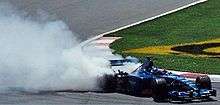Doughnut (driving)
A doughnut or donut is a manoeuvre performed while driving a vehicle. Performing this manoeuvre entails rotating the rear or front of the vehicle around the opposite set of wheels in a continuous motion, creating (ideally) a circular skid-mark pattern of rubber on a carriageway and possibly even causing the tires to emit smoke from friction.[1] The move was first done as a race celebration by Alex Zanardi after the 1997 Long Beach Grand Prix, where he performed the manoeuvre as a way to give back to the Long Beach fans and the atmosphere they produced for the teams and racers. He continued to use it as a form of celebration throughout his racing career. The move has now become the post-race celebration of choice for many victorious drivers.[2]

Other terms used for describing this maneuver include "mixing Starks", "spinning sedys / doing a sedy", "making cookies / cutting cookies", "round brownies", "cyclone", "diffing", "spinning brodies".
Doughnuts are more easily performed on wet and frozen surfaces (ice and snow), as well as on loose surfaces, such as dirt. When performed in the snow, it is more often done to have fun than it is to make an earnest attempt at creating the circular skid mark pattern. In Australia, doughnuts performed in dust or mud are colloquially referred to as "circle work".
Performing the doughnut manoeuvre can be hazardous. Strain is placed on the vehicle's suspension and drivetrain, which may result in mechanical breakdown with loss of control. Tires are also subject to severe wear which may result in a sudden loss of pressure or blowout. In snow, however, the strain placed on the vehicle is much less. Hence, rally drivers prefer to learn car control in such situations.
See also
References
- "Doughnuts". Modern Racer. Archived from the original on 26 January 2010. Retrieved 6 December 2016.
- Schrader, Stef. "How Alex Zanardi Made Donuts The Post-Race Celebration Of Choice". Jalopnik. Retrieved 2018-04-01.